#jjk satosugu theories
Text
JJK0: Gojo’s secret words and Chapter 236: A Satirical translation Geto’s “……”
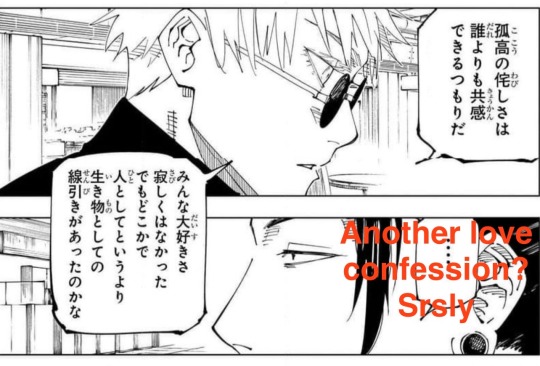
Gojo: "I love everyone, so I'm not lonely anymore..."
Geto: ........... (Another love confession? Srsly - translations in edit were my own, lol)
Give him a break Gege 😂 how many times does he have to witness people telling him that they love someone else?
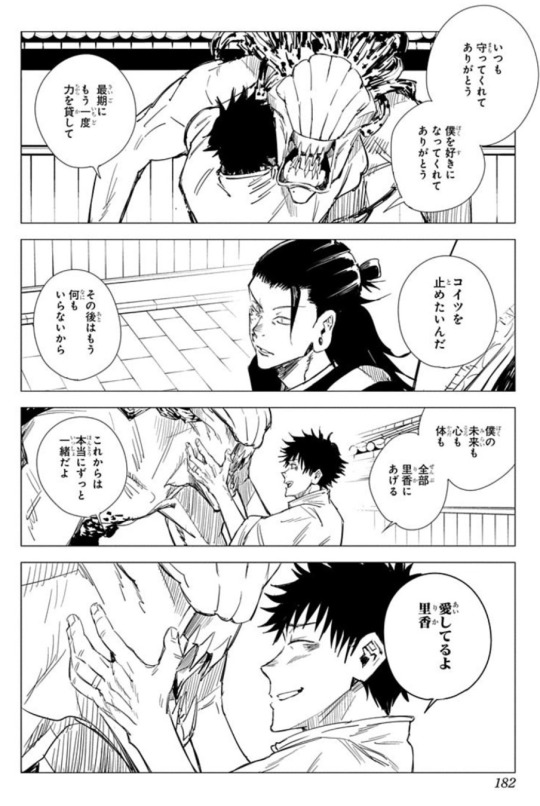
Yuta: From here onwards, let’s really be together forever. I love you Rika. (愛してる used; a more traditional “embarrassing” way to profess a romantic love).
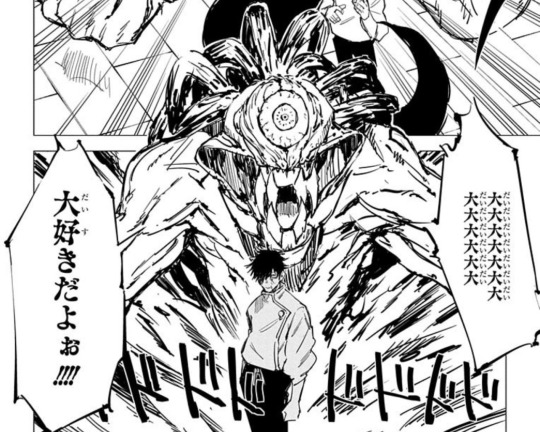
Rika: “daidaidaidaidaidaidai daisuki da yo!!” (Uh, it’s like “so so so so so so so- I love you SO much!!!")
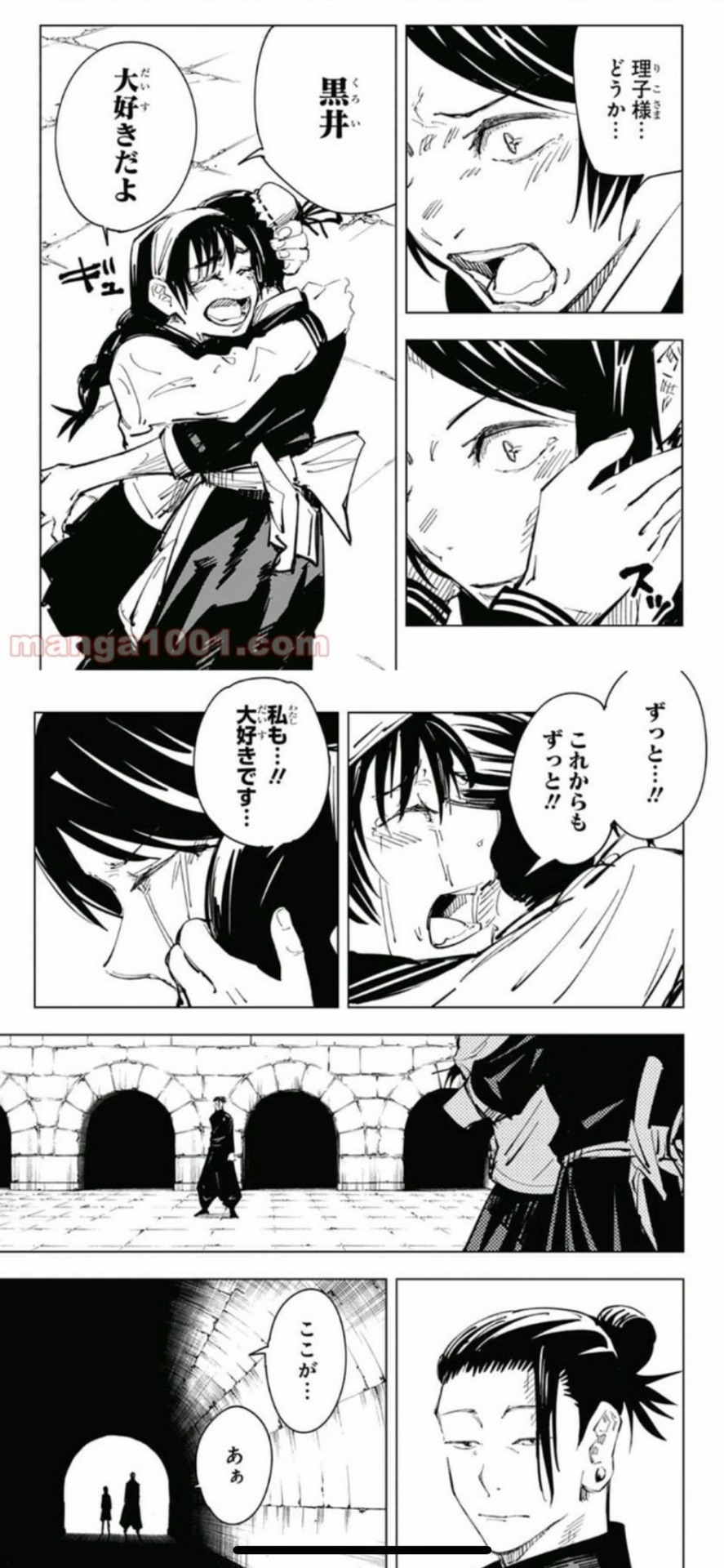
Riko: Kuroi, I love you! From now, and until forever!
Kuroi: me too...!! I love you...
No wonder love is like a curse - people seem to die if they get confessed to.
People loved Geto and I think it's not a stretch to imagine that when love was directed to him, it might not have been voiced out. Geto witnessed confessions made to other people. If they loved him, he probably never got told because this isn't really a part of the Japanese culture.
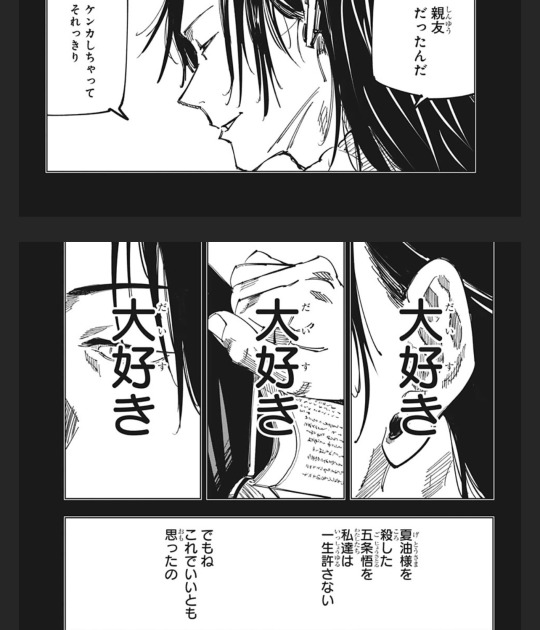
The twins: love, love, love.
It is interesting to note that they don’t actually say they love him. Just 「大好き」 which literally translates to “big liking/affection”. It is implied through.
But the panels above and below refers to Gojo (above, Geto: “my best friend” in the past tense, “there was a fight and that was that.” And below, MimiNana: “we couldn’t forgive the Gojo Satoru who killed our Geto-sama, but we were willing to let it be...” it is cut off in my screenshot, but it goes onto say because Gojo was Geto’s one and only best friend).
One could also stretch the interpretation and say that because they recognised the love Geto has for Gojo, they were be willing to let it be. Just like Yuta recognised the love Gojo has for Geto and sought to slay Kenjaku so he didn’t have to do it again.
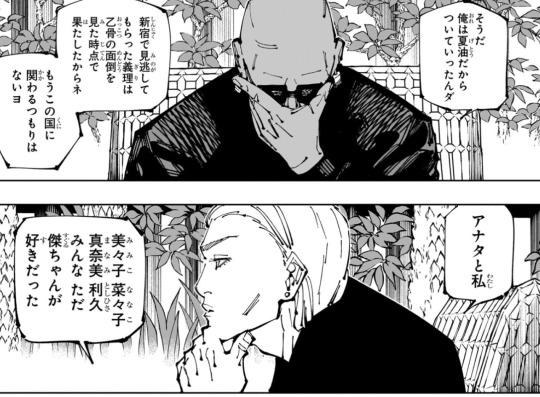
Larue and Miguel again noting in their exchange that they all loved Geto, and they cared for each other like family. There was another time where they referred to being familial, but loving wasn’t mentioned, so I left it out on purpose. But it was implied. Geto had a set of scrolls hanging behind him at the temple that said, “Death to the foolish, Punishment for the weak, Love for the strong.” I guess he felt all those things were true. But when it was his end, he only wanted Gojo Satoru there. I’m glad he got to choose who killed him I guess. And his family escaped.
So with Gege’s love for foreshadowing, maybe all of those scenes of confession-witnessing and love implications parallel with this moment:
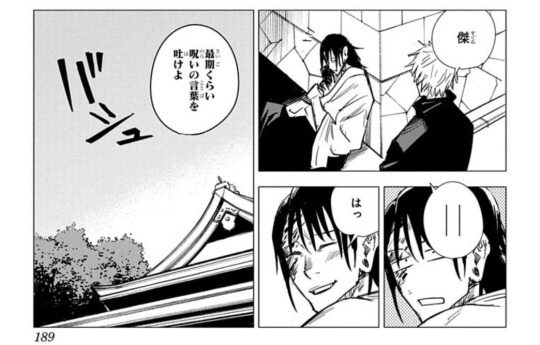
Ha.
It really would make so much more sense if Gojo’s last words were, in fact, 「大好きだよ、僕の親友」 (“I love you, my best friend.” - in fact, it makes more sense than simply, “you’re my one and only best friend.” It is pure headcanon though (´∀`)
As I mentioned earlier: The phrase 「大好き」 and usage of it doesn’t necessarily mean romantic love, but rather “to like a lot”. I’ll hold my hand up and say I’m not native speaker though, so please accept my apologies if I’m wrong and please correct me if I am! My understanding is that the context matters a lot. The English VA said it was three words in the English language - “my best friend” sounds weird conversationally. “You did well” seems oddly placed and may not illicit a blushing smile. “I love you” seems more apt. Personally, anyway.
I don’t think the same word-limit is imposed in the Japanese version. So again, I think it’s a phrase like “I love you my best friend”. Because it was also apparently embarrassing and said before within jjk0 (could be anyone’s words) but never between them.
So the criteria is met as Gojo is likely to use Rika’s version of “I love you” (daisuki da yo) over Yuta’s “I love you” (aishiteru). Not likely said between them in their friendship.
Also, because he has used it in chapter 236 to refer to the students - so! It is not a stretch for him to say that to Geto. It also explains why Geto goes, “…..” as the phrase of affection may have been familiar to him. He may be thinking about how Gojo has grown and reflected on how distant they felt - when the line was drawn. He notices that Gojo recognised the shift in him. Or, it could be that he “overthinked” that he was replaced.
And then the clincher is, ofc, where as soon as Geto thinks he can conclude that Gojo has been fulfilled by his students cuz he said he is no longer lonely and he had an all-out brawl with another man that he (Geto) never managed to give the Strongest, he is told: his presence would have likely made Gojo satisfied. Bahahaha!! Yes, you shed those tears... you’re loved, you dumbo. (I say that lovingly.)
Gojo Satoru as the Strongest may have needed something you can’t give, but Gojo Satoru as himself was only satisfied with you. Can you be honest now?!? Gojo, is it really enough for him to be by your side and waiting for you at the airport, huh??? Or was it enough for you to see the millennia-old Kenjaku be shocked silly by Geto’s body proving his undying love for you by moving when you called out his first name?? lol. These boys make me feel like a giddy schoolgirl at times; yeah, if only this story wasn’t so dark.
Anyway, it’s an overdone analysis, I know. The common consensus is that Gojo tells Geto he is his best friend. But to me, it makes the most sense for his last, most sincere words to Geto, to be a confession of his feelings for him. It aligns well with Gojo saying he needed him to feel fulfilled in chapter 236 and his tearful / heartfelt chuckle. It aligns well with the love is a curse theme, and love following Geto everywhere, and him witnessing people professing their love too. He just never really knew that he was loved, or if he did, the one that mattered the most was Gojo and if he had known, it may have helped him receive love (be happier) in this world.
I mentioned earlier that love was seen to be a curse by Gojo. And through what Geto knows about cursing and what he has witnessed through the deaths and burdens carried by those who have loved and lost... could this be a reason for why Geto doesn't say it back to Gojo?
We will never know. Nanami chose his words to Yuji as well. So saying something like, 'I deserve to be cussed out at the end' is vague and as much as an apology.
I've said in a previous post too, that I personally feel his heartfelt smile was like a thanks and a nod to how he could smile sincerely - recognising the same bond they shared over their blue spring.
Like the hidden words kept between them, I hope his way of communicating was something also understood just between them.
That’s it from me on this topic - thanks for reading if you did.
Sorry if some of it is repetitive.
#jjk satosugu theories#jjk satosugu#satosugu#jujutsu kaisen#gojo satoru#geto suguru#stsg#jjk analysis#jjk meta#jjk anime#jjk spoilers#jjk 236#jjk chapter 236#jjk 0#jjk0#jjk satosugu analysis#jujutsu kaisen theory#jujutsu kaisen analysis#jujutsu kaisen manga#jujutsu kaisen Japanese#jujutsu kaisen headcanon#satosugu headcanon#jujutsu kaisen satosugu#sugusato#goge gego#goge#五夏
70 notes
·
View notes
Text

Are You Satisfied?
As you might have heard chapter 236 of Jujutsu Kaisen ends with the death of Gojo Satoru. The fandom is making a pretty big deal about it. As someone who predicted from the beginning that Gojo was going to lose against Sukuna, the reaction is fascinating to me. This is perhaps the most controversial chapter of Jujutsu Kaisen I've ever seen. So I've decided to throw my hat into the ring.
The central theme of Jujutsu Kaisen is death, so the death of one of the main characters isn't too surprising, but what does Gojo's death mean for the story? What does it say about his character?
As I said above I am a little bit shocked by the extreme controversy over Gojo's death. Gojo was never going to win the fight in the first place, because Jujutsu Kaisen is a story and the story would be over if he defeated Sukuna. He'd easily be able to take care of Kenjaku afterwards and the main conflcit would be resolved. Would it really be an interesting story if Gojo one shotted the villains while the kids just wathced on Television?
The story is also not about Gojo, it's about the students. Gojo may think he's the protagonist of reality but he's not the protagonist of the story.
Once again, Jujutsu Kaisen is a story and stories have themes. We may grow personally attached to characters, but characters are just narrative tools to convey the themes of a story, no different from prose, dialogue, and art. Characters are a tool to be used well or used poorly, and sometimes yes that means killing them. Whether Gojo's death was naratively satisfying though isn't the purpose of this post though we're only asking what does it mean?
Finally, Jujutsu Kaisen is not only a fictional story, it's specifically a tragedy. Full disclosure, it's a manga about death.
The Protagonist of a Tragedy
So, number one shout out to me for making this post 4 months ago where I called the way Gojo would end the fight.


Excuse me while I fist pump for calling it!
The question on everyone's minds is why does one of the most powerful characters in the manga die offscreen in a pretty humiliating way, cut in half and helpless on the ground just like Kaneki. The reason Gojo didn't get a more heroic (or cooler) death is because we're not reading My Hero Academia, this is not a story about heroes or even a typical Shonen manga it is a tragedy.
In poetics Aristotle defines tragedy as:
"an imitation of an action that is serious, complete, and of a certain magnitude; in language embellished with each kind of artistic ornament, the several kinds being found in separate parts of the play; in the form of action, not of narrative; through pity and fear effecting the proper purgation of these emotions" (51).
To paraphrase a tragedy is about human action, actions characters make in a tragedy often have dire consequences. One of the most common consequences if the reversal of a hero's fortune, a hero of a tragedy usually starts out on top and ends up on the bottom because of the bad choices they make. If in normal shonen manga characters overcome their flaws through effort and persistence, in Jujutsu Kaisen we see characters more often than not lose to their flaws.
The reason I posted that Kaneki panel specifically is because it was a brilliant moment of narrative punishment for Kaneki's central character flaw. Kaneki the hero's main flaw is that he always fights alone, and he constantly makes that same choice over and over again to fight alone. One of the characters helpfully explains it as well.

Stories are primarily about change. If a character doesn't change they're not serving the plot, unless that specifically is the point. People have pointed out how abrupt it is for Gojo to get sealed in Shibuya, get let out, and then immediately die afterwards but that's kind of the point. Gojo made more or less the exact same choice (he asked for Utahime's help for a buff but otherwise fought the entire battle himself). The definition of insanity and what not, why would doing the same thing over and over again net him a different result?

Not only did Gojo choose to fight alone, but as I've been hammering on and on about in previous meta the entire fight Gojo cared more about fighting a strong opponent then he did saving Megumi, the child he was responsible for.
Jujutsu Kaisen is not a typical shonen manga where everything is resolved by beating a strong villain in a fight. That's specifically why I used the Tokyo Ghoul reference, because the reason Kaneki is defeated offscreen like that is because he thought the world worked like a shonen manga. He has a fantasy sequence where he's fighting Juzo in a shonen battle tournament like this is Yu Yu Hakusho right before it snaps back to reality and he's limbless on the ground.
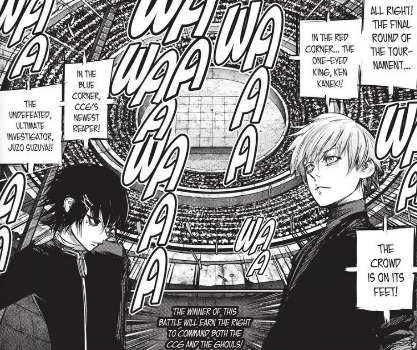
Gojo is a major character in the manga Jujutsu Kaisen, literally "Sorcery Fight" and he is the best sorcerer in the whole world. His entire identity revolves around being a sorcerer. Since he is so good and beloved at what he does, he thinks that everything is resolved by exorcising a curse or defeating a strong opponent. He has basically no identity outside of that. Which is why when he's fighting the possessed body of his student, a person he's been mentoring since childhood his priority is not to save Megumi but to beat a strong opponent. Gojo is a sorcerer, before a human being. That's who he is, that's who he always has been since day one.
I think part of the negative fan reaction comes from fans being really attached to this scene in the manga and deciding Gojo's entire character revolves around being a good mentor figure to children.

Which is just incorrect, Gojo's entire character revolves around being the strongest. On top of that though, Gojo can care about children and also care about being the strongest he can care about multiple things at once and have those things contradict each other because humans are complicated. I'd point out even in this panel where he's stating motivation he's not trying to raise these kids up into being healthy adults, he wants them to be strong Jujutsu Sorcerers. Even when he's raising kids, his intention is to turn them into Jujutsu Sorcerers because everything in Gojo's mind revolves around Jujutsu Sorcery. Gojo does not exist outside of the world of sorcerers. Gojo may be the chosen one but he'd never be able to hold down a job at Mcdonalds.
I think in general readers put more investment in the things characters say out loud, rather than their actions. You can say one thing and do another. I can say "I should never eat sweets again I'm going to improve my diet", and then go and eat ice cream five hours later. Gojo can state out loud his intention to foster children and protect their youths, but then fail to properly do that in the story. Characters are not always what they say they are, that's why they're interesting to interpret. This isn't me calling the readers stupid, just pointing out that Gojo is made up of contradictions. He wants to get rid of the old guard and replace them with something new, but Gojo IS THE OLD GUARD.
If the culling games arc has shown us one thing, it's that ancient sorcerers brought to the modern age do not care that much about human life on an individual level, they are all of them egoists. There's a reason Gojo resembles someone like Sukuna more than he does any other character in the manga. I'm not saying Gojo is exactly like Sukuna, he's far more altruistic and uses his genuinely noble ideals but at the same time Sukuna is a shadow archetype to Gojo he represents Gojo's flaws. The flaws that Gojo succumbs to in tragic fashion.
Which if you believe that Gojo genuinely does love his students, and the ideal he's fighting for is to raise up a better generation and allow them to live out their youths, then Gojo throughout the entire Sukuna fight is acting against those ideals. He cares far more about fighting Sukuna then he does saving Megumi, it's shown over and over again in the battle, Megumi is an afterthought to him. If Gojo care moredefeating the big bad and saving the world is more important than helping a child that Gojo is responsible for then Gojo is acting against his stated principles. Why should Gojo win the fight when he's fighting for all the wrong reasons?
Tragedies are like visual novels, if you make the wrong choice the novel will give you a red flag. If you ignore the red flag then you get locked into the route with the bad ending. Gojo always fights alone. Gojo only ever fights for himself, even if he's using that selfishness in support of a more noble ideal like creating a better generation of sorcerers. If Gojo consecutively makes the same changes then in a tragedy he's not going to be rewarded for it.
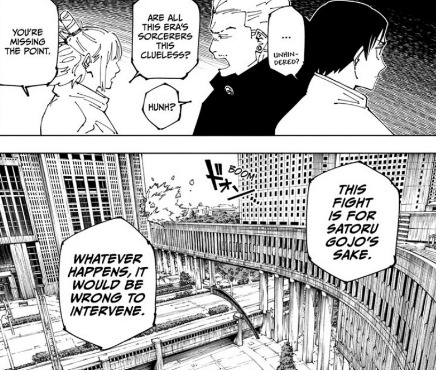
Gojo wants the old generation out and the new generation in, but Gojo resembles the old generation too much. Old sorcerers like Hajime and Sukuna respect him, Hajime argues that Gojo being able to fight for his pride is far more important than him living to the end of the battle when Yuta wanted to interfere and help him.
Gojo's death isn't a surprise curve ball that Gege is throwing us for shock value, it's a result of his choices throughout the manga. A manga about change, and the change between generations is not going to punish a character for remaining roughly the same. Of course you might find it disappointing that Gege didn't give Gojo the chance to grow and change and experience a character arc like Megumi or Yuji, but Jujutsu Kaisen is a tragedy, and the way Gojo's arc ended is consistent with what Gege wrote.

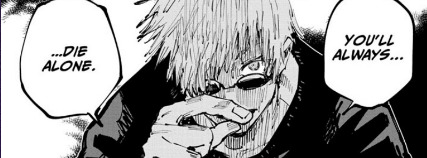
Jujutsu Kaisen is not just a tragedy though, it's a manga about death. The manga begins with Yuji's grandfather warning him not to die alone the way that he did. His grandfather's dying words are what motivate Yuji throughout the beginning of the manga as he's searching for a "proper" death.
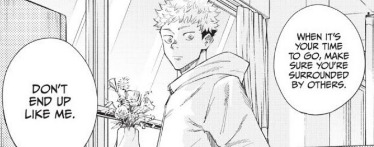
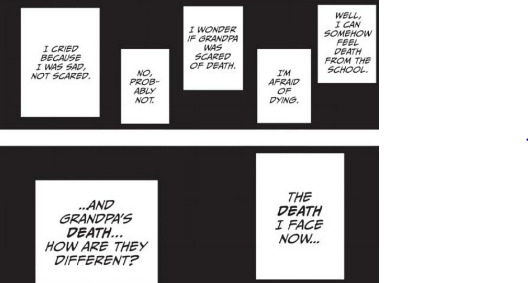

One of the major themes of Yuji's character is a contemplation of death. He accepts that death is inevitable, so he wants to save them from the gruesome deaths they'd experience if they became victims to curses and allow them to have a more satisfying death. Yuji's grandpa died an unsatisfying death because he died alone in a hospital room. Yuji even tries to make his own death a satisfying one because he believes by dying to seal away Sukuna he'll reduce the total number of casualties to curses.
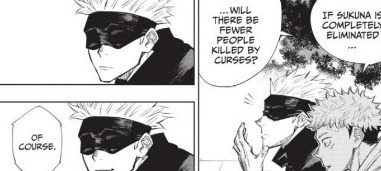
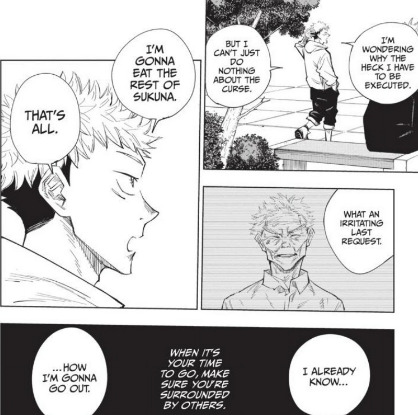
Jujutsu Kaisen keeps investigating the theme of death and what exactly would make for a satisfying death. At one point it's all but stated that death is the mirror that makes humans analyze their lives.
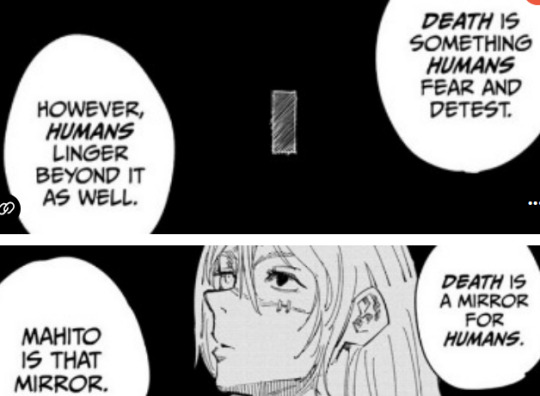
When Yuji fails to save Junpei from the "unnatural death" it calls into question whether or not his goal of saving people from unsatisfying deaths and the gruesome deaths caused by curses is even feasible. Nanami even says that Yuji might not be able to accomplish his goal and warns him away from the path.
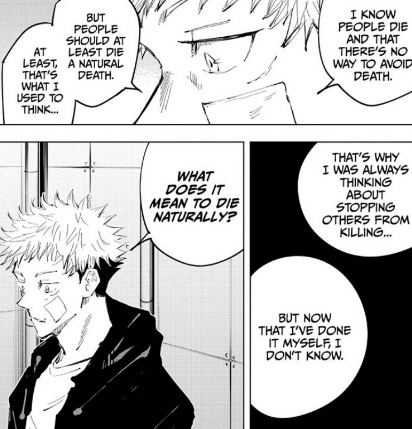
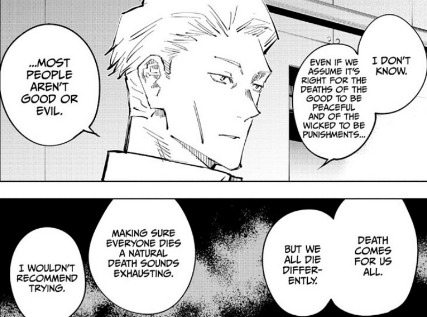
We see repeated unsatifying deaths in the manga, each time someone reflecting on their deaths that they weren't able to get what they wanted out of life. This list comes via @kaibutsushidousha by the way I'm quoting them.
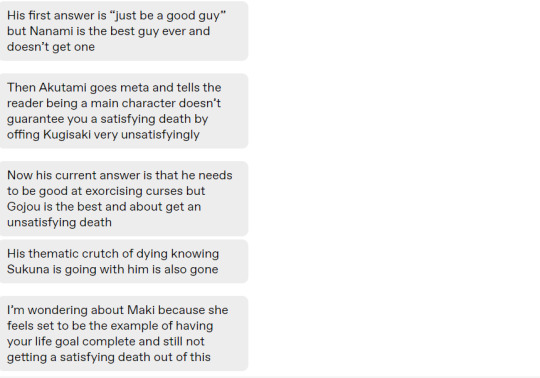
Nanami's a character who chose to work as a sorcerer because he didn't want to evade the responsibility of doing all you can to help people, he wanted to believe he's somewhere where he's needed. He never runs away from responsibility like Mei Mei does so he quite literally works himself to death, living and dying as a sorcerer. Nanami or Gojo's dying hallucination of Nanami even says as much, his death is the result of him choosing to go south and returning to be a sorcerer.
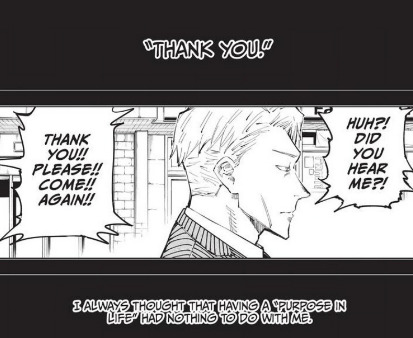
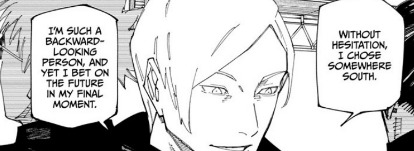
Maki chose revenge against the Zen'in over her sister, and as a result Mai is dead. Maki has all the power in the world now, her revenge complete but she's left with a sense of "now what?" She's as strong as Toji now but she failed to protect her sister, and it's the result of the choices she made. Maki's reflection isn't triumph, it's "I should have chosen to die with her."

Even Yuji himself is robbed of his narrative purpose. The manga began with Yuji saying he wants to choose how he's going to die and he'll die taking out Sukuna with him so he can reduce the number of people killed by curses in the world. Both of those things are thrown in Sukuna's face. Number one the amount of people Yuji can save by permanently killing Sukuna is now a moot point because he let Sukuna rampage in Shibuya.
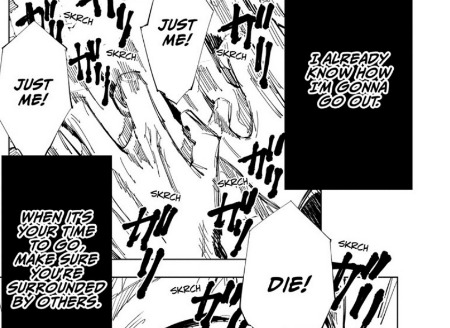
Number two, Sukuna isn't even in Yuji anymore. To build on what Comun said though, this repeated tragedy has a purpose to it and understanding requires understanding that Jujutsu Kaisen is an existentialist manga. Existentialism is basically a school of philosophy centered around the question of "Why do I exist?"
There's nothing about the invetability of death to make you question why you're alive in the first place. In the myth of Sispyhus, Albert Camus boils down all of philosophy to one question.
"There is but one truly serious philosophical problem, and that is suicide. Judging whether life is or is not worth living amounts to answering the fundamental question of philosophy. "
All of philosophy is should I shoot myself in the head or should I keep living? Everything comes after that question, which is why in Jujutsu Kaisen a lot of the characters motivations revolve around them contemplating death. Sorcerers exist in a world where they can die any moment, and as Gojo says most of them die alone. It might be the nature of sorcery itself that causes so many people to die, not only are they dying because they are trapped in an uncaring system, but the characters themselves aren't really attempting to live outside of it. They live and die as sorcerers, replaceable cogs in the machine.
All of these unsatisfying deaths may just be the result of all these characters making one choice, to live as sorcerers rather than people. Because to exist means to live in the world.
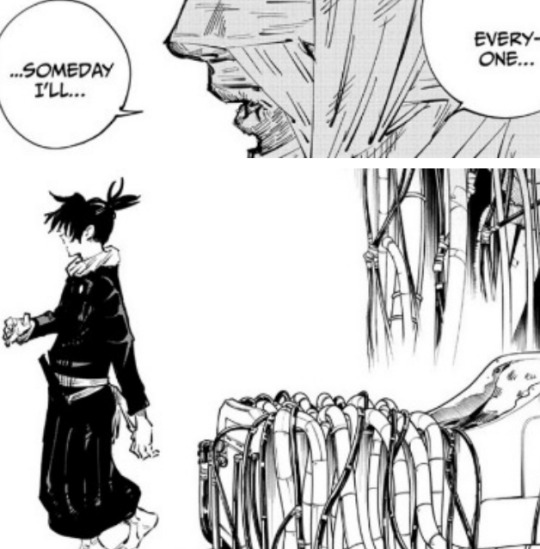

Even in Mechamaru's case, his goal is deeply existentialist by what I defined, all he wants to do is live in the world with everyone else rather than be stuck in his hospital room but his actions contradict that goal. Instead of letting his friends come and visit he's obsessed with the idea of getting a normal body because he feels that's the only way he can exist with everyone else, he makes a deal with the devil, he lies and goes behind their backs. He wasn't living with everyone else in the world and he could have chosen to, he chose wrong and his death is the result of that choice.

Jujutsu Sorcerers aren't living in the world. They're living in a little snowglobe far removed from the world with its own rules, most of them regressive and disconnected from the rest of society. If you define existentialism as just "living in the world' then a lot of these characters aren't, because they only exist in the world of sorcery.
INVISIBLE BUFFY: What are you talking ab-
SPIKE: The only reason you're here, is that you're not here. (drinking) INVISIBLE BUFFY: Right. Of course, as usual there's something wrong with Buffy. She came back all wrong. (moving around on the bed) You know, I didn't ask for this to happen to me.
SPIKE: Not too put off by it though, are you? (drinking) INVISIBLE BUFFY: No! Maybe because for the first time since ... I'm free. She tosses the sheet aside. Spike looks around, trying to figure out where she's going.
INVISIBLE BUFFY: Free of rules and reports ... free of this life.
SPIKE: Free of life? Got another name for that. Dead.
Not living in the world with everyone else is the same as being dead.
A lot of these characters either make the choice to act alone, or be a jujutsu sorcerer rather than a person and because of that they die as sorcerers, b/c sorcerers die that's what they do. Mai didn't want to keep living as a hindrance to Maki so she kills herself. Maki didn't want to be anything other than a sorcerer, so her little sister dies and she's not a big sister anymore. Nanami chose to leave his job behind and become a sorcerer again, he dies as one.
Of course I don't think the manga is punishing characters for being too egotistical, but rather too unbalanced. If anything Mai is too selfless and that is why she died, she didn't want to live for herself and chooses self sacrifice for her sister. An unbalance between selfishness or selflessness results in an underdeveloped ego. Jujutsu Kaisen doesn't punish individualism per se, moreso if you're not a fully developed individual you won't last long. Because it's also a manga about growing up in the world, and a person who doesn't have a healthy, mature, well-balanced sense of self is not a grown up.
This twitter user det_critics points out that Gojo (and also Yuki + Yuji's) failures in the manga can be attributed to the fact they don't have real senses of self.
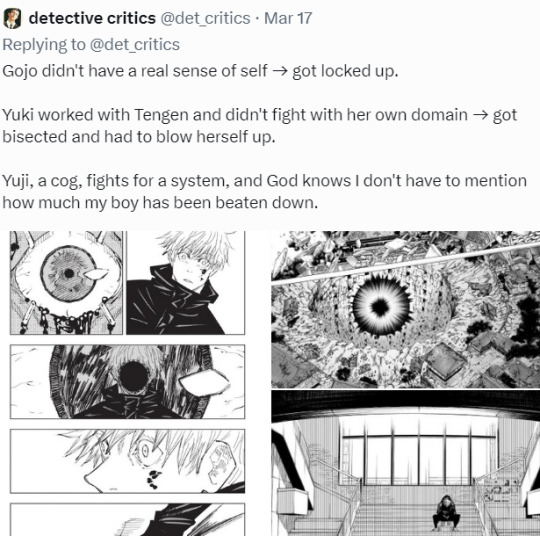
Gojo has an identity crisis as outlined by Geto, "are you Satoru Gojo because you're the strongest, or are you the strongest because you're Satoru Gojo?"
It's a challenge for him to find some reason to live outside of being the strongest, and in tragic fashion Gojo just doesn't find it in time. Gojo lived for fighting others, and proving to himself that he's the strongest, and that's how he dies.
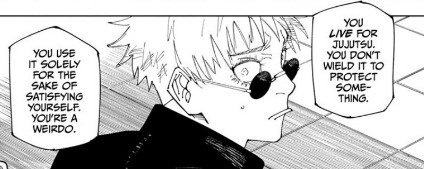
There's something I like to say about narrative punishment in stories. There are two ways to punish a character, you either don't give them what they want, or you give them exactly what they want. This is the latter, Gojo wanted to find someone stronger than him because deep down he believed that nobody could understand him unless they were on his level. He wanted to be surpassed, and that's why he focused on creating stronger young sorcerers, but he never shook himself of the belief that only someone as strong or even stronger than he was could ever be emotionally attached to him so he made a deliberate choice to draw a line between himself and others.
Gojo's essentially gotten what he wanted from that choice in the worst way possible. The student he picked to succeed him Megumi, has his body stolen and kills him. Gojo is surpassed, but it's not by one of his own students it's by an enemy that's not only trying to kill Gojo but is going to massacre his students afterwards.
Gojo's spent his entire life believing that because he's more powerful that makes him inherently different and above others, and being lonely because he himself believed he couldn't relate to ordinary people and he dies like an ordinary person, an unsatisfying death where he wasn't able to bring out Sukuna's best, where he gets unceremoniously cut in half offscreen but yay he's no longer the strongest. He's gotten exactly what he wanted. Megumi is still not saved, Sukuna's probably going to kill more people because Gojo failed to stop him here, but hey at least he stopped to compliment Gojo.
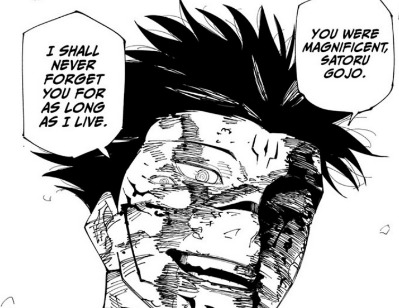
It's empty, but it's empty because of the choices Gojo made in life to just not bother connecting to people or develop any kind of identity besides being a sorcerer. Gojo lives and dies as a sorcerer, and his dying dream is returning to a teenager being surrounded by everyone he was with during his school days, because that's the happiest time in his life. Ironically he was happier before he became the strongest, because that was the only time in his life that he allowed himself to connect to people.
However in the eyes of others, he is someone who has it all. That's why he is always alone. There was no one who could hold the same sentiments and mutually understand him. Geto was the only one who could understand what he was trying to say, and the only one who could communicate well with him.
It's no coincidence Gojo and Geto die exactly a year apart on the same day, if anything I'd say the reasons they die are similiar to at least thematically. They both die because they don't want to live in the world. Geto thinks the world is too corrupt and GOjo doesn't want to be anything other than a sorcerer, both of them fail to adapt.
「 'It's just. . .'
It's just that it was what Geto had to do.
[...] To someone like him, the reality that the world of sorcerers presented to him was just too cruel.
'. . .that in a world like this, I couldn't truly be happy from the bottom of my heart.'」
They can't be happy in a world like this from the bottom of their hearts, so narratively they both die. The things they chose to live for at the end of their life they fail to accomplish, Gojo is no longer the stronget, Geto fails to wipe out mankind or make major changes to the world and they die as normal people unsatisfied because they weren't trying to live in the world and make connections to others. They die almost karmically a year apart because their main connection for both of them, the thing which made them feel connected to the world and other people was each other.
Which is why this panel breaks my heart and is so narratively satisfying because of how unsatisfying it is...
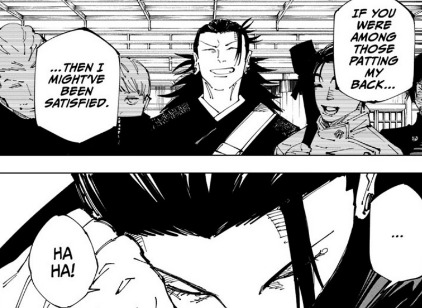
"If you were among those patting my back... then I might've been satisfied."
Gojo reflects that he's not satisfied dying against Sukuna, not because he failed to give him a good enough challenge but because Geto wasn't there to pat him on the back. The one thing that would have satisfied him he couldn't have, because he didn't live to connect to people he lived to be the strongest and he died alone as the strongest. There's just something deeply upsetting about Gojo's dying dream fantasy just him being there talking with all of his dead friends who he never appreciated or connected to properly when he was alive. Knowing that if something had just gone a little differently, that even if he had to die no matter what he could have died happier if Geto was among the people saying goodbye to him because that connection with Geto is what gave his life meaning.
Dazai Osamu: "A life with someone you can say good-bye to is a good life, especially when it hurts so much to say it to them. Am I wrong?"
-Bungou Stray Dogs Beast
#gojo satoru#jjk spoilers#jjk meta#jujutsu kaisen 236 spoilers#jjk 236#jujutsu kaisen 236#jjk 236 spoilers#jujutsu kaisen#jujustu kaisen meta#jujutsu kaisen theory#jujutsu kaisen manga#satoru gojo#geto suguru#suguru geto#satosugu
2K notes
·
View notes
Text
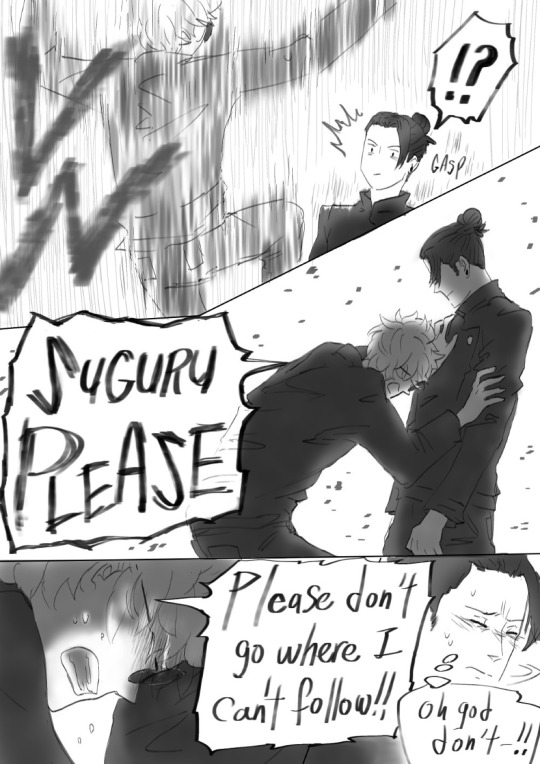
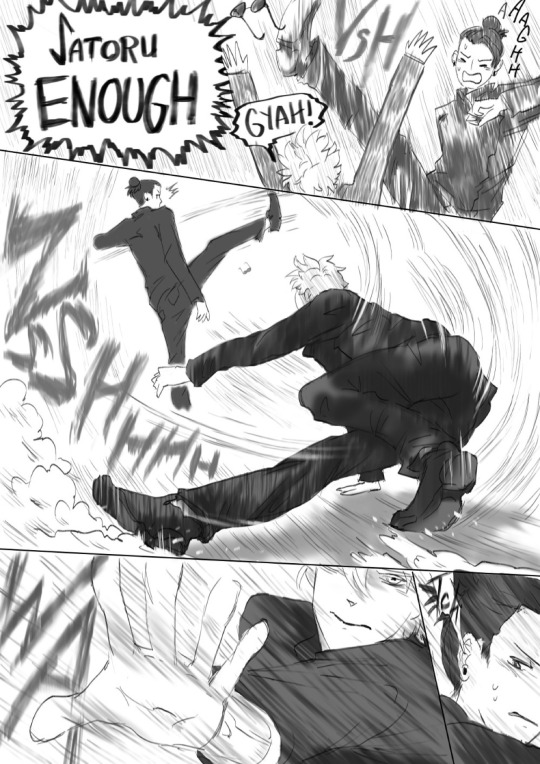
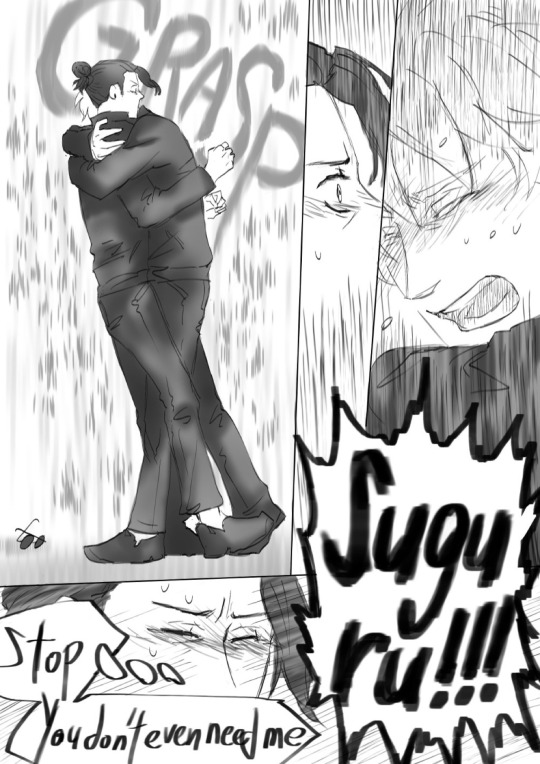
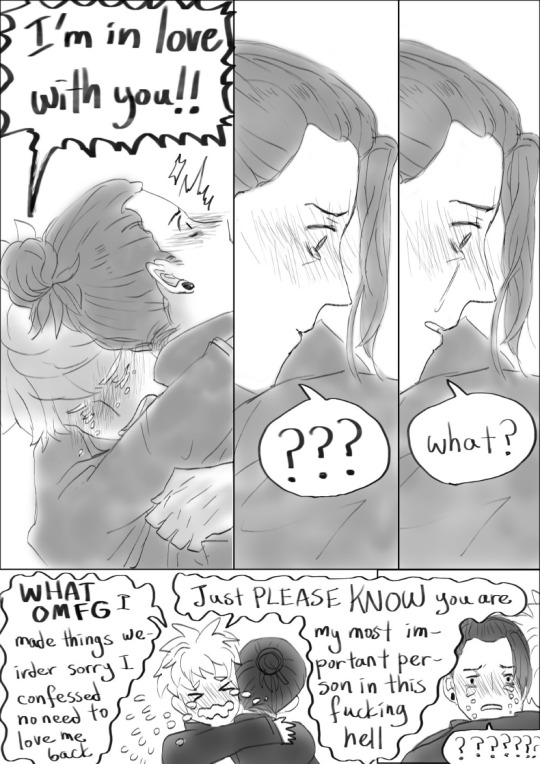
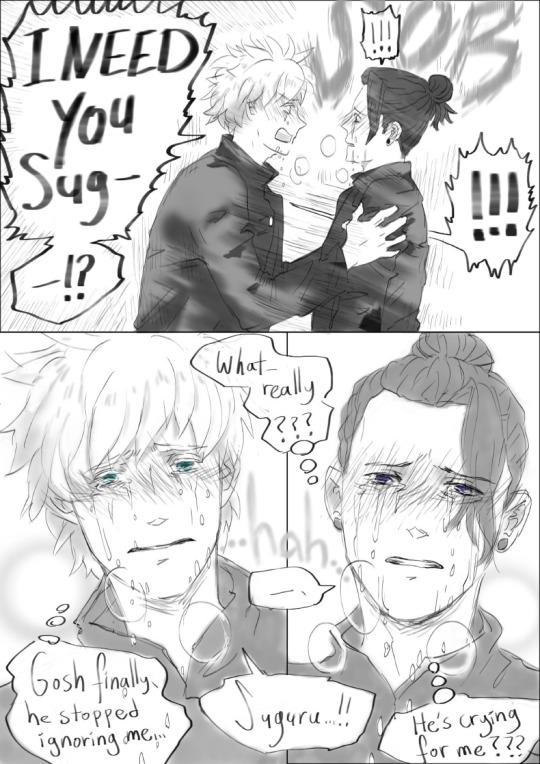
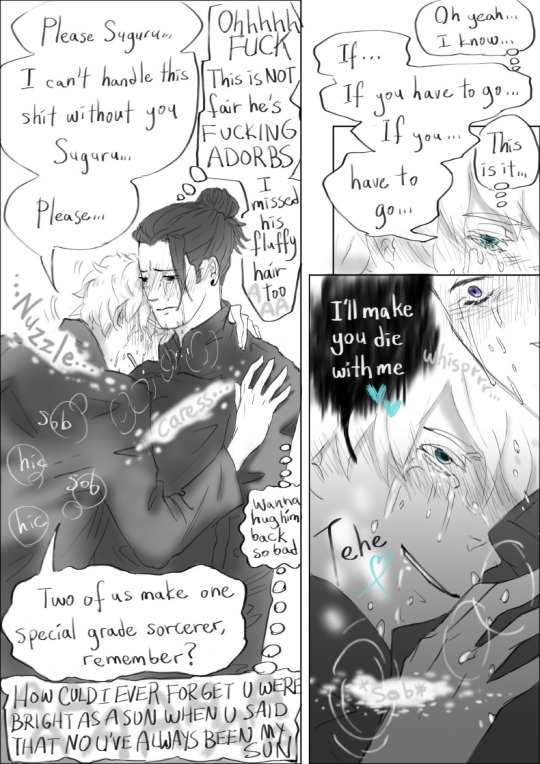
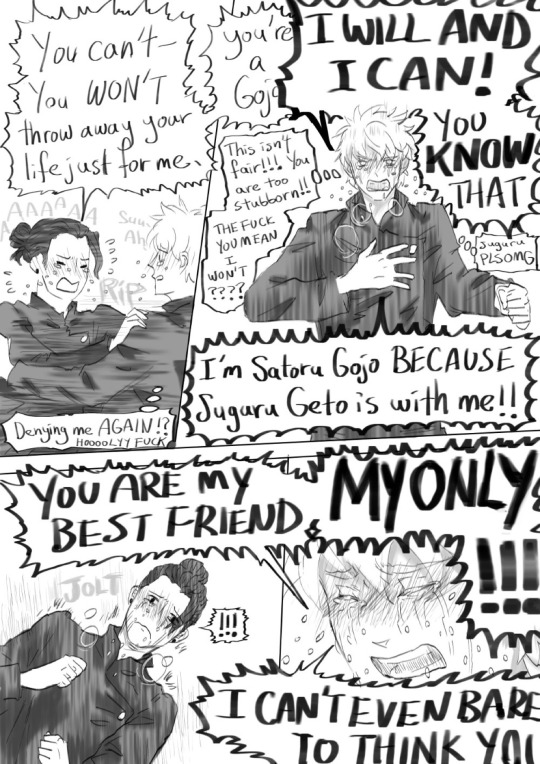
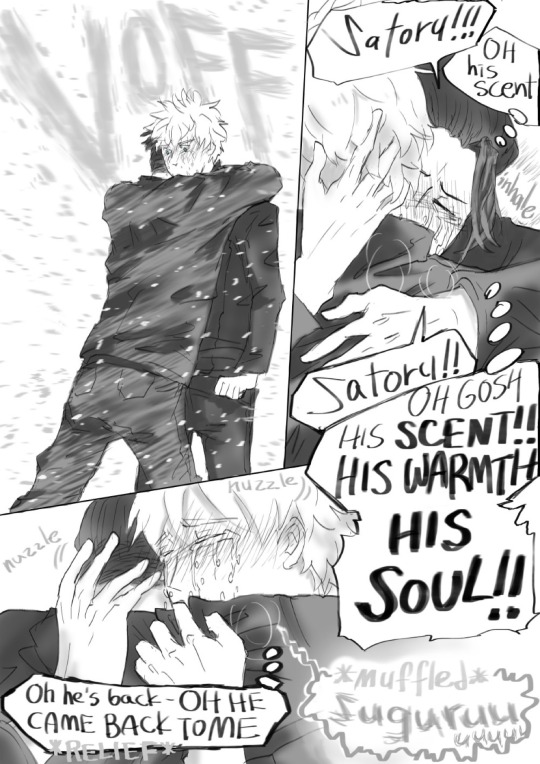
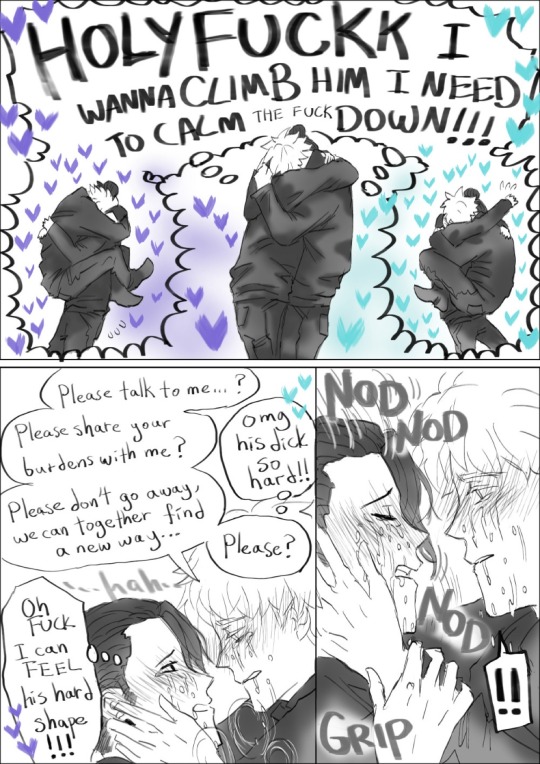
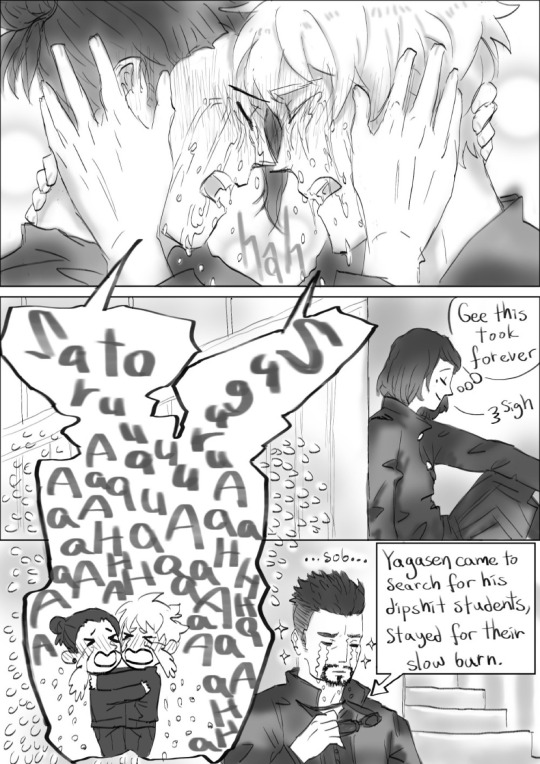
Part 2
#satosugu#五夏#jjk fanart#gojogeto#jjk#jujutsu kaisen#gojo satoru#geto suguru#jjk gojo#jjk geto#ruusuustory#no one asked but while drawing part 2 i heavily listened to Linkin Park albums Hybrid Theory and Reanimation#glad i finished part 2 but i drew fast than usual and gave myself a fever so ill be drawing slower next part
173 notes
·
View notes
Text
a lot of people are saying that narratively it would be anticlimactic if it isn’t gojo who defeats kenjaku, bc kenny is in geto’s body. but gojo’s sealing scene airing in the anime this week reminded me of something - as far we know, kenny STILL doesn’t know much about yuta as a sorcerer. he hasn’t learned more during the culling games (as far as i remember?), so he doesn’t know (bc geto didn’t know) that yuta is a special grade on his own, and cursed rika, not the other way around.
which means when gojo before being sealed says that yuta will beat kenny, while kenny laughs it off in shibuya, i think in the end gojo will be right. obviously the final fight has to be yuji vs sukuna. and specifically yuji and megumi’s soul vs sukuna, to parallel and tie up megumi vs sukuna and yuji’s soul. but just like this story has multiple protagonists, it also has multiple villains - the person who it makes the most sense to be the final face off for kenjaku is YUTA.
1) yuta has defeated geto’s cursed techniques before.
2) narratively it would be full circle if gojo’s student and teachings defeats the ancient curse user who stole gojo’s beloved’s body. especially if gojo died before he could properly mourn geto’s body like he said he wanted. there’s also a theory that with gojo dead, yuta could copy the six eyes + limitless, but even without that, it would work.
3) the main theme of jjk is BREAKING LITERAL GENERATIONAL CURSES. if the only special grade sorcerer left alive (Yuta), trained by Gojo who mentored a new gen to operate differently and care about each other and change jujutsu society, defeats one of the most powerful curse user’s of ancient times (Kenjaku), it will be a symbolic defeat of the cycle, and of the new finally exorcising the bad of the old.
#original post#jujutsu kaisen#jjk spoilers#jjk 236#jjk theory#satoru gojo#satosugu#yuta okkotsu#kenjaku#shibuya arc#sukuna
622 notes
·
View notes
Note
Y'all talking like you wrote jujutsu kaisen. I'm not Gege but l think he wrote them as just good friends not anything more. Its just fanfiction. Plus y'all can actually tell that they are friends/brothers cause of the way they act. Anyways no use in arguing cause neither of us are the writers of Jujutsu Kaisen and its not giving us anything productive. Like we barely are increasing skills of making money or helping others and were wasting time on debating on Gojo and Geto who aren't even real!
.....fine you keep SatoSugu a relationship and l'll keep them a brotherhood
it seems like you're the only one who's pressed about debating the nature of gojo and geto's relationship. you say gege is the one holding the reins, yet you're determined to define their connection according to your reductionist understanding of relationships. the only unproductive part about all of this is your insistence that you alone possess omniscient insight into gojo and geto's relationship, which is nonsensical at best and laughable at worst.
as i've explained extensively, gojo and geto are meant to be interpreted in a critical manner. it's not gege's fault that some of his fans seem to lack the basic analytical skills to do so. gojo and geto may not be real, but your dedication to undermining their relationship certainly is. maybe you should heed your own advice and start "making money" or "helping others" instead of getting up in arms about characters that very clearly escape your narrow worldview.
#my jjk thoughts#ask#jjk#jjk meta#satosugu#satosugu analysis#gojo satoru#geto suguru#geto#gojo#jujutsu kaisen meta#jujutsu kaisen analysis#jjk analysis#queer discourse#lgbt discourse#jjk queer discourse#jujutsu kaisen queer#satoru#suguru#jjk theory#jjk thoughts#anon ask#stsg#satosugu brainrot#stsg brainrot#sugusato#goge#gego
113 notes
·
View notes
Text
on december 24th, both suguru and satoru passed away
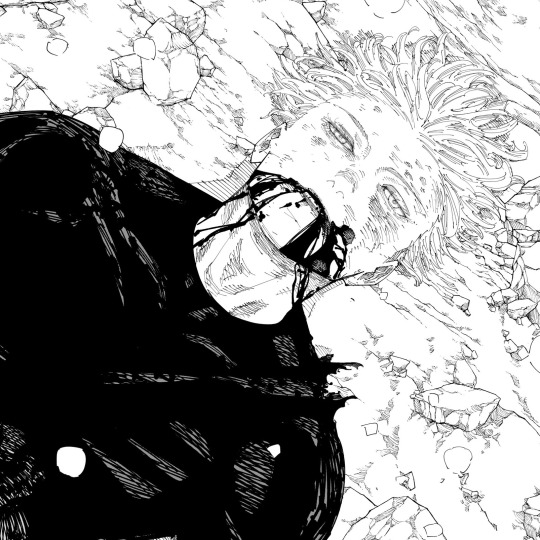

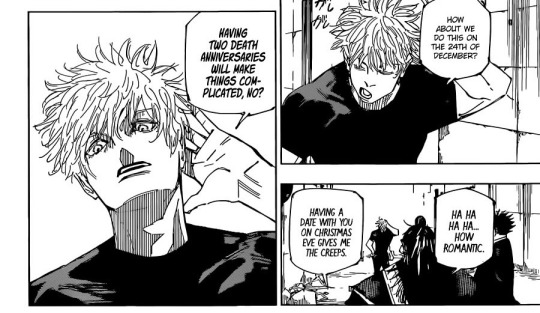
after their deaths on december 24th, both suguru and satoru had their bodies stolen and used as tools

#jjk#jujutsu kaisen#jjk manga#jjk 0#jjk 236#jjk 261#satosugu#stsg#gojo#geto#satoru gojo#gojo satoru#suguru geto#jjk geto#jjk gojo#okkotsu yuta#jjk yuta#jjk kenjaku#kenjaku#jjk theory#jjk moodboard#gojo jjk#geto jjk#yuta jjk#kenjaku jjk#gojo and geto#jjk icons#jujutsu kaisen gojo#jujutsu kaisen geto
58 notes
·
View notes
Text
From the person who brought you unhinged JJK S2 fish discourse, please accept my humble new offering: me holding up images whilst screaming ferally at you: did ya see?! did ya see what they did with the colour symbolism in episode 4 and what it Means?! Well dw cause I'm here to serve you a heinously long meta-analysis regardless. This episode has completely undone me and I need to give you a blow by blow account of why
I want to go in depth about the final scene of e4 bc that's really what set the cogs whirring in my mind, but let's start with the following image bc it exemplifies everything, not just in terms of the colour symbolism but of the heartbreaking changing relationship of stsg

Throughout the previous episodes and opening/credits of S2 we have been made to associate the colour blue + lightness with Gojo and the colour red + darkness with Geto. The sparkling blue eyes and stark white hair of Gojo, his Limitless: Blue technique, the white fish, the way he is often shown standing/walking in the light, turned to face Geto versus the black hair + dark eyes of Geto, the black fish, shown standing/walking in the shadows, turned away from Gojo (etc etc)
Yet the final scene of e4 flips this on its head and what this Means is, quite frankly, soul destroying
We join Geto as he walks along a dark, narrow corridor flooded with red light until he reaches heavy doors. He's confronted with his own image, reflecting back at him, before using both hands to prise open the door. When he steps into the bright white light of a high-ceilinged room, his face falls as Gojo emerges like a messianic figure from the applauding crowd, carrying the shrouded corpse of Riko (side note: god I have a lot of thoughts on Gojo as a messianic figure but I'll save that for another time)
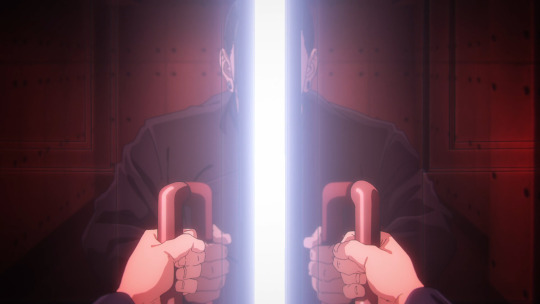
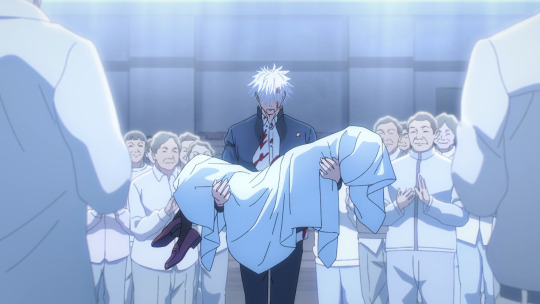
Gojo approaches Geto with his head bowed (whereas usually he is always looking up at Geto) and the moment Geto lays eyes on Gojo he knows something is wrong (similarly to Toji earlier in the episode). He barely seems to recognise Gojo and though Gojo's eyes still sparkle with their bright blue infinity, his expression is dull and lifeless. Geto asks disbelievingly in a way that stabs me right through the heart: "Satoru. Is that you?"
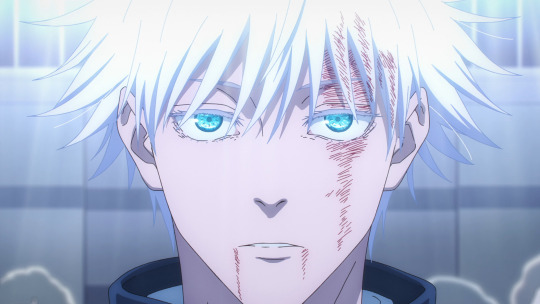
At the start of the conversation, the camera pans from Gojo on the left to Geto on the right and is shot from below in a way that emphasises the growing cavernous expanse between them
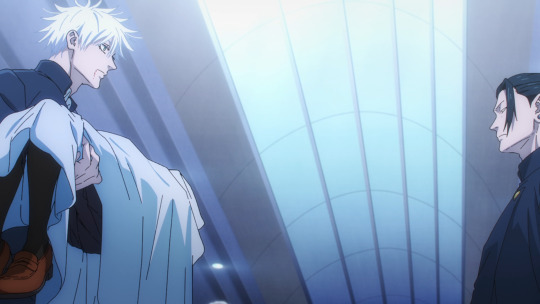
But it's what happens in the following moments that's really the killer
Gojo states that he fucked up and that everything that has happened is therefore his fault. Geto tells Gojo "let's head back" (I read this both as: let's head back home and as an indication that Geto wants things to go back to how they were). The camera then cuts to Gojo's mouth as he asks flatly - "Suguru, should we kill these guys?" - and then zooms out as he continues - "The way I feel right now, I doubt I'd feel anything about it." The camera zooms out, showing Gojo standing in front of the applauding crowd, holding Riko's body and continues to draw back, making Gojo seem as if he's getting further and further away from Geto, as well as from us, whilst his eyes glow ethereally
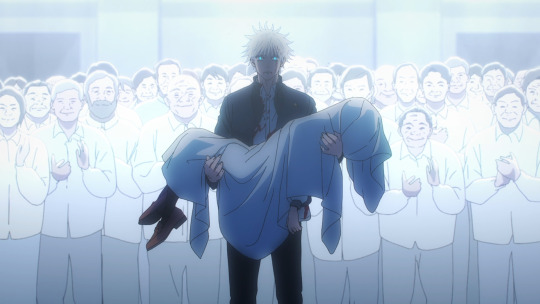
I want to do a separate post about what happens with Geto, Gojo + their relationship in episode 5 but I do also want to point out here: this is the scene that Geto experiences invasive flashbacks of in the following ep. It's the moment that he realizes that he's lost Gojo, that Gojo is now fundamentally different in a way that Geto doesn't recognise or understand, that Gojo is far beyond his reach
As Gojo walks past a motionless Geto, away from the light and into the darkness, we cut to Geto's downcast eyes, pupils dilating wildly as though he's in shock/about to cry (this harkens back to the fish, the way that Geto can no longer bear to look at the white fish as it swims past). We are then left with Geto standing in the bright blue-white light telling Gojo that there's "no point" in killing them, whilst Gojo replies in the darkened, red corridor "does there really need to be any point to it?"

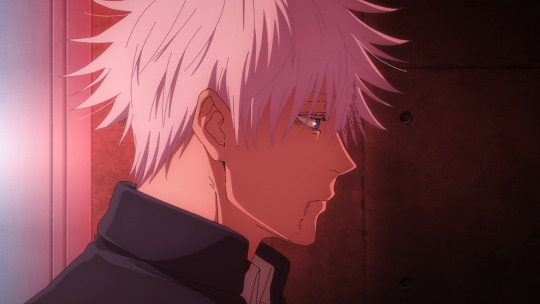
Gojo is a broken man, a complete shell of who he once was and this scene demonstrates Gojo's transition as he turns away from Geto. The colour symbolism, though, is present throughout the earlier parts of the episode and beautifully illustrates how we arrive at this exact moment (as well lays the foundations for what comes next)
Let's return to our blue/red colour theory bc there's a lot going on here during this episode!
E4 starts on a banger: we're cruelly given a recap of Toji telling Geto that he killed Gojo and then within the space of about 7 minutes, Geto too has been killed. It's tragic and sad and none of us want to be reminded of it but I'm going to (srysrysry) because hey, check out what's going on. Notice the cool blue tint of Geto's "death" versus the vivid red of Gojo's? (a horrible eg I know but you should've heard my scream when I caught onto it)
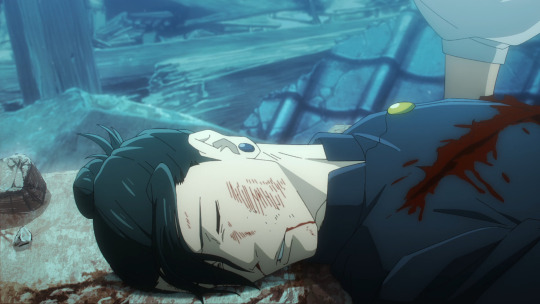
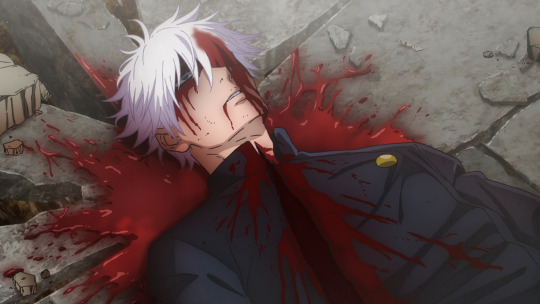
And here's another cool example that had me ajdjsksjdk bc ofc I clocked Gojo using his red technique, but look at the blue glow around Geto's hand?! I don't recall seeing it being used for Geto before (correct me if I'm wrong) so it's interesting to see it being used here, plus us seeing Gojo using Red properly for the first time
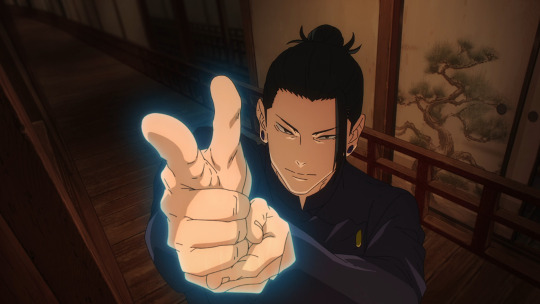
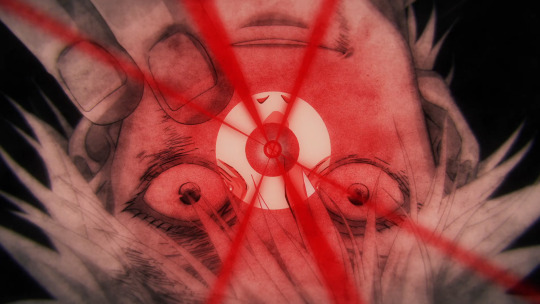
Let's just pause here for a moment bc this is a hugely important moment for Gojo's character arc and the fight with Toji gives us an incredible colour theory moment
In the previous episodes, we've seen Gojo being able to easily use his Limitless Blue technique but remember how, in E2 Gojo tried to use Red and hilariously fucks it up announcing "I failed" and resorts to punching the bad guy instead? It isn't until this episode, after Gojo has used reverse cursed technique whilst on the verge of death to heal himself (idk if heal is the right word) that he is able to learn to use Cursed Technique Reversal: Red
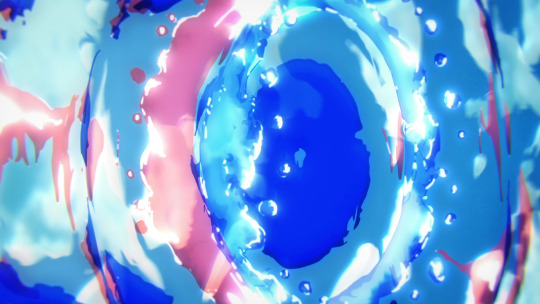
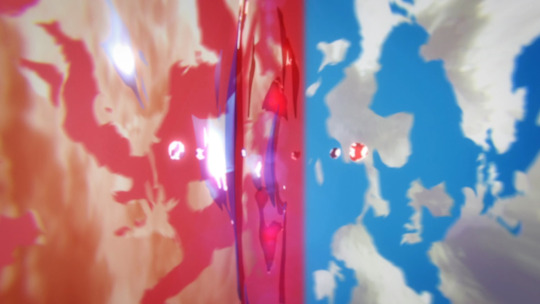
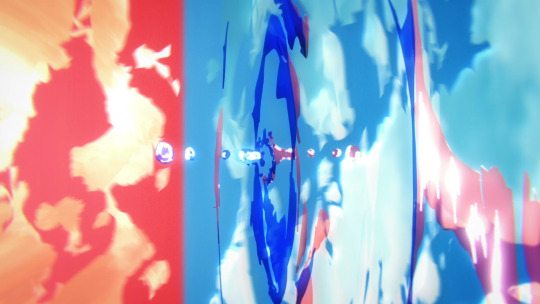
We have this really beautiful animation sequence during Gojo's fight with Toji. A blue and a red droplet swirl around each other and then splash together to reveal a swirling rotation of blue and red rippling water. The colours converge, red droplet slipping into blue water, blue droplet into red. The droplets come together to form the shining purple infinity plucked between Gojo's fingers, granting him the "Hollow Purple" technique that allows him to blow a hole through Toji.
Gojo explains:
"Reverse cursed technique uses negative energy. While it can enhance the body, it can't regenerate it. Multiply that negative energy against itself to create positive energy... Take the amplified and the reversal, then smash together those two different expressions of infinity to create and push out imaginary mass."
Gojo + Geto, amplified + reversal = two different expressions of infinity -> create / push out
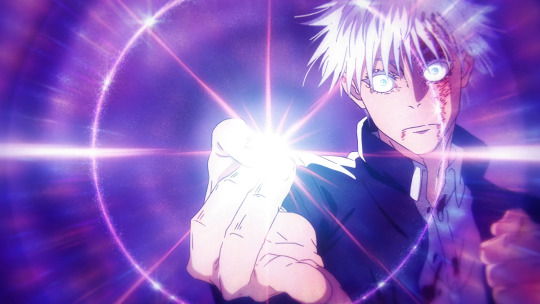
Toji "killing" Gojo was the moment that set Gojo on a different path, which allowed him to evolve beyond belief and causes him to ascend to, what he believes is, divinity. He takes the basics of Blue and Red (primary colours; Gojo and Geto) and mixes them together to create something new, something transcendent, something that surpasses who he (and Geto) were before. He becomes an unstoppable power that far surpasses everyone else, and this is what Geto recognizes: that Gojo has evolved without him (which we know from E5 has huge consequences for Geto's thinking)
And so now, finally, let us return to Geto at the end of E4
After Gojo asks Geto "does there really need to be any point to it?" (killing), the camera flashes quickly between the applauding audience and Geto's empty hand, which he then clenches into a tight fist. He raises his downcast eyes to look forwards (resolutely, looking into the future) and responds: "it's very important there is..."
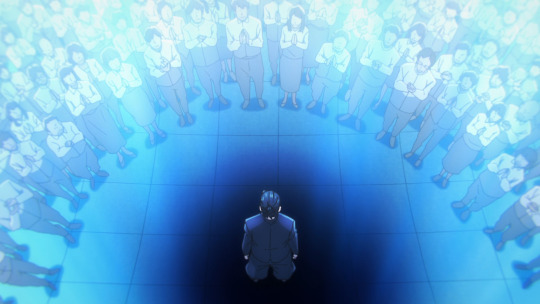
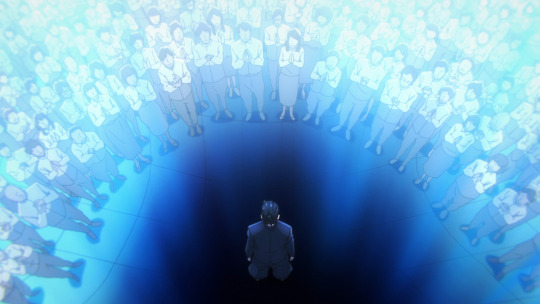
We're left with the image of Gojo standing on a blue floor, surrounded by the clapping crowd. The floor wavers as an all consuming darkness pulses beneath him, locating Geto as it's central point as it surges out towards the crowd "...especially for a jujutsu sorcerer."
We're reminded of the conversation where Geto and Gojo almost come to blows whilst playing basketball in E1. Geto's argument that jujutsu sorcerers exist to protect non-jujutsu sorcerers whilst Gojo complains about having to protect "the weak" + patronisingly tells Geto to get off of his moral high horse.
Now we witness the extent of Gojo's apathy in action, as he pulls away from everything and everyone, and the swinging of Geto's moral compass from protection to genocide as he's left behind in the ruins of all that once was, of everything and everyone that he loved
#goddddd this gave me brain rot for about 6 hours?!#idk if people will appreciate it as much as fish discourse but FUCK I needed to just get it out of my system bc it's driving me insane????#these two are making me + a good chunk of the internet unwell but i'm glad we can all be unwell together#also I have A LOT more to say about gojo geto + stsg more generally so I might continue to inflict long-winded meta analysis onto tumblr#like BOY do I have a bunch of shit I need to say about e5 so I guess that'll be another 5-6 hours of my life spent on that#rrp analysis#stsg#satosugu#gojo#gojo satoru#geto suguru#jjk colour theory#jjk fish discourse#geto#jjk#jjk season 2#jjk s2#jjk s2 e4#jujutsu kaisen season 2 spoilers#jujutsu kaisen season 2#jujutsu kaisen
203 notes
·
View notes
Text
If I recall correctly, when Gojo kills Geto in JJK0 there’s the sound of a blade? Which I’ve always thought was interesting because it’s not Gojo’s usual style to use weapons like that, and killing a sorcerer without using cursed energy will result in the killed person becoming a cursed spirit. Logically this means that the weapon used would have been some sort of cursed tool. Now, when Toji spared Geto it was because he wasn’t sure what would happen to all the cursed spirits he’d consumed if he were to die. It’s possible he was being overly cautious, and that if he’d used inverted spear of heaven on Geto, his technique would have been nullified just like Gojo’s. After Toji’s death, the weapon would have probably fallen into Gojo’s hands. It’s possible that Geto had no spirits left after unleashing uzumaki on Yuta, but why take chances?
What I’m saying is. What if Gojo used the weapon that had killed him ten years ago to kill Geto. What if he killed Geto with a weapon that he knew what it was like to be killed by. What if he made sure to do it gently, so Geto’s death was kinder than his had been, at Toji’s hands. What if it symbolized just how much Toji hurt them both, then and now. What’s more romantic than to kill your lover the way you were once killed, and then die on the same day a year later?
62 notes
·
View notes
Text
Sometimes I feel like a silly weirdo for shipping Satosugu so hard, but then I hear a clip of “my heart and my soul know otherwise” and I remember that I am not at fault here.
#my actual honest opinion is that Gege/MAPPA are trying to have their cake and eat it too#please the shippers and the no-homo anime bros#and my theory is that Gege wants it to be canon but maybe it’s just not feasible as a shounen manga#but there is no way that Satosugu is not at least intentionally ambiguous#jjk#jujutsu kaisen#satosugu#stsg#satosugu meta#Gojo x Geto
93 notes
·
View notes
Text
A (not so) brief theory about Sukuna and Tengen:
HEAR ME OUT OK
TL;DR: Sukuna/Tengen's relationship parallels and exists within the same repeating cycle of Geto/Gojo and Yuji/Megumi, which seems to form the basis of the overarching JJK storyline
I don't necessarily think that their relationship was romantic in nature (although it could have been), but there are clear parallels in the relationships between Sukuna/Geto/Yuji as well as with Tengen/Gojo/Megumi.
(A few of these parallels are just seen with Sukuna/Geto and Tengen/Gojo because Yuji and Megumi are still living out their main story, but so far it adds up. I'm also going to focus less so on Yuji and Megumi in this post since that has been discussed plenty already.)
I've listed below the cut where I think these parallels are and what other clues have been hinting at this:
Direct Parallels:
“The Fallen”
Angel refers to Sukuna as "The Fallen," which not only indicates him as someone who is evil or lacking in morality, but also as someone who had previously not been that way (i.e he had to "fall" down from somewhere). Therefore, we know that Sukuna must have been someone who was well respected and probably a "good" person before he turned and became a curse user. It it thus not unlikely that Sukuna would have at least crossed paths (if not more!) with Tengen when they were both on the same side of Jujutsu society and the two strongest of their time. Sound familiar?
We know that Geto was also someone who "fell" from grace and respectability like this, after being in his close relationship with Gojo (who remained in that position after Geto's fall). This fall is something that happened following a very traumatic event that restructured how Geto looked at the world around him (and himself within it)—we also see this same thing happening to Yuji over the course of the story (especially with Megumi currently being taken from him and potentially dead—just like Gojo was during the fight with Toji). Could it be that Sukuna experienced the same thing during the Heian era to make him become "The Fallen"?
Remains of their Bodies
In chapter 220, we see Sukuna’a mummified body dressed as a monk left at the site of one of Tengen’s purification barriers, and it is noted how it is not actually needed for the basis of the barrier. Thus, it seems that Tengen had placed Sukuna's body at the centre of one of their most sacred locations, in a position and attire of significance and respectability. Why would she do this with someone who supposedly was the one of the most evil sorcerers in history if it did not matter to the creation or maintenance of the actual barrier? The only answer which makes reasonable sense it that she carried some sort of lingering emotional attachment to Sukuna in some way.
Similarly, in JJK 0, Gojo has to kill Geto, but notably does not take care of his body afterwards in the proper way. This is not exactly elaborated upon, but it is certain that Geto's body was not cremated, and given the reason for this lack of proper body disposal was his emotional attachment to him, it is probably likely that he was intent on doing something else to properly respect his life — perhaps giving the body to Geto's newfound family or interning him differently. Whatever it was, he clearly defied whatever treatment his body was going to endure at the hands of Jujutsu society who viewed him as an evil and corrupt person.
"The One who Taught him about Love."
In Sukuna's fight with Yorozu, she realizes that someone has already taught him about love in the past. During his fights in Shinjuku, this is also repeatedly brought up again, and he seems to think very bitterly about it—which indicates that whoever "taught him about love" is probably someone he cut out from his life in some way, that he may have parted ways with philosophically and that he detached himself from the idea of enduring love, pushing that aside the best that he could.
We know that Geto pushed Gojo (and his love) away when he sought to embark on his quest to rid the world of curses. We also know that he believed that after this Gojo hated him (even though he did not), potentially also looking bitterly back at the past and his naivety about love—he didn't think that love could be that enduring (even though his still endured, he did not think that it was reciprocated).
Eating Curses etc to Gain Power
Sukuna's CT is still unknown to us, however, we do know that in chapter 249, he ate something sent by Kenjaku and absorbed its power in some way. We also know that he is canonically a cannibal, and that he often will use cooking metaphors in his speech, indicating that his CT may have something to do with eating people/something else to gain power.
Geto's CT is that which involves him eating curses in order to absorb and control them, thus forming the basis of his power.
Yuji's CT is also still unknown to us for the most part, but we do know that he has an inherent ability to absorb the power of cursed objects that he eats—notably, Sukuna's fingers. It is also implied that he ate the rest of his brothers, the Cursed Womb Death Paintings, and absorbed their powers through that (such as blood manipulation, which it is heavily implied he able to use now).
"The King of Curses"
In chapter 3, Sukuna is referred to as "the king of curses." In JJK 0, Gojo calls Geto "the worst curse user" (and Geto also is someone who has the power to control curses as their master—I wonder what other word can be used to describe this relationship?). We see then that both Sukuna and Geto are seen by those around them as simultaneously superlatively strong and evil with relation to curses in their respective times.
Other Hints:
Tengen's New Form
When Kenjaku met Tengen again, he called out how Tengen’s current form seems to look a lot like Sukuna’s true form (with a knowing tone in how he pointed this out). Clearly, it is being hinted at here that there is some sort of history between Sukuna and Tengen where Tengen is still holding very closely onto his memory in some way. It is also potentially relevant to mention here how Gojo's blindfold changed in colour from white to black after Geto's death, showing a potential similarity in memorializing their fallen and lost friend—and a refusal from both of them to move on even after they were gone.
Ties of Fate
It is already established in canon that fate and repetitive cycles of fate exist within the JJK universe, where we see how Kenjaku has been tied to the owner of the six eyes for a millennia and is always somehow doomed to lose to them. If this is true, then would it not be plausible that another cycle of a tie of fate exists between these three duos?
Breaking the Ties of Fate
Sukuna remarked recently how Yuji has a spirit that is near-unbreakable (unlike himself according to this theory) and we have also seen how Yuji, despite the trauma he has gone through, has not fallen in the same way that Geto or Sukuna did. Will the crux of the story rest in Yuji's ability to break this tragic cycle of fate? Or will it fail the same way that Kenjaku's sealing of Gojo failed to break his own cycle of failure to the Six Eyes?
If you actually read all of this thank you for entertaining my rambling theory!
#jjk#jujutsu kaisen#jjk theory#sukuna#ryomen sukuna#tengen#satosugu#itafushi#geto#gojo#i think this is the longest thing i have ever posted in my life#mine#text
55 notes
·
View notes
Text
Just some thoughts about chapter 236 after reading 261. I’ve talked about it elsewhere but I’m going to post it here too.
The whole North South thing has been a huge thing to unpick. As had been the human and jujutsu pervert thing.
But, after 261, it seems to be about reconciliation - between Gojo’s Human side and his Monster side. Perhaps the ongoing theme for Gojo since his enlightenment - is he Gojo Satoru who is Strong or does being Strong define him as Gojo Satoru?
From that premise, that’s why he talked about himself and emotion with Geto - elaborating on “satisfaction” etc. Nobody else was there when they did. It could be a representation of who is within the line Gojo drew. Others are flowers who couldn’t understand him / he didn’t wish to understand him. (I believe Gojo too didn’t want to be saved but lived since birth as if he were to be the saviour due to six eyes + limitless ). Even if at some point he felt like a creature, he has always only been Geto who he wanted to stand beside him as his best friend. He caught up to him, right? They face in the same direction.
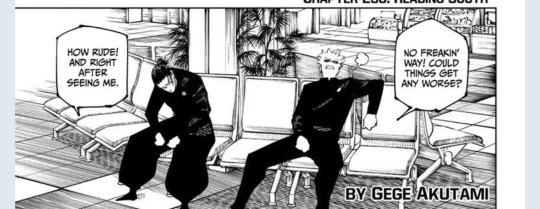
The benches is something to take note of too imho: the symbolism of Nanami & Haibara being on the other side of the benches perhaps is meant to represent the Monster Gojo (ie Strongest Gojo Satoru).
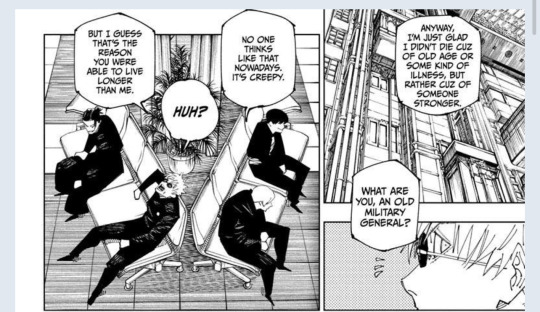
So Nanami and Haibara highlight his perverse, jujutsu mad side. They reflect how he could be viewed, or even what he could’ve become. It’s not nice to hear at all. He worked hard not to be that, hence, I think, his facial expression there. But, Gojo accepts it as a part of who he is too. Geto roasts him and echoes that based on what he admitted - practically having fun fighting the death?? Oh dear 😅 But, it shows how Gojo in death reconciled between his two halves. With the aid of his friends.
The North South thing after 261 seems to be thematically similar - going back to being more Human. Gojo’s monstrous side had fun and he has relinquished the Title of being the strongest. So his choice was to go South because that’s where happiness is for him. He understood that love changed him and that it had allowed him to not be lonely as the strongest in the end, having people around him, having purpose, etc. which he wanted to convey to Sukuna. He could have been a monster / calamity Sukuna but thankfully he knew love and could connect with those “beneath his feet” (this was in direct contrast to Hajime’s battle / convo with Sukuna).
It makes me sad to think that it is possible that this interpretation doesn’t allow for a Shinto-like afterlife and they all have to get onto the plane to reincarnate.
Or. It was really a death fantasy after all... aligned with Bardo Thodol...
…and all we can take comfort in is that Gojo was at peace?
Ah, I’m going to make myself depressed thinking about it 😭 we probably won’t get answers from Gege anytime soon so I’ll stubbornly choose to believe there is a Shinto-like afterlife and if they want to reincarnate they can go meet Emma-O to discuss things - like... you know, reincarnating together 😉
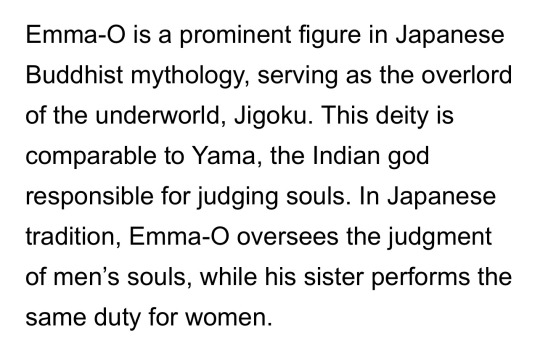
Just my two cents... any thoughts or theories?
#Gojo meta#satosugu#jujutsu kaisen#gojo satoru#geto suguru#stsg#jjk spoilers#jjk analysis#jjk meta#jjk#jujutsu kaisen 261#jujutsu kaisen 236#jujutsu kaisen afterlife#jjk afterlife#jjk gojo#jjk manga#jujutsu kaisen manga#jujutsu kaisen analysis#jjk theories#jujutsu kaisen theories#jujutsu kaisen meta#jjk satosugu theories#jjk satosugu
45 notes
·
View notes
Text
i think everyone saying that gojo is being treated as a puppet and even his closest ones see him as the strongest first.. forget that maybe ending sukuna is more important to them? I mean imagine if gojo would've gone along with geto? If geto wouldn't have said "no" to gojo after riko's death? Weren't the strongest would actually become the "monsters" in the eyes of jujutsu society after that? But tell me did not doing those things, and going other way around avoid them from becoming monster or did it avoid gojo specifically from becoming a monster as yuta says in the #261leaks? No. It's as if inevitable.. but then what's the point of doing good and being good and wanting everything to happen in more rational and morally correct way if you're going to be seen just as mere an asset by the end of the day lol
#jujutsu kaisen#gojo satoru#jjk 261#geto suguru#jjk theory#jujutsu gojo#gege akutami#gege when i catch you gege#satosugu
28 notes
·
View notes
Text
OKAY THIS THEORY CALLS TO BE SEEN BUT IT IS SO OLD BUT I APPRECIATE GEGE ON THE DETAIL HE DID NOT LEAVE A SINGE THING ‼️‼️‼️🎤

#hrtsuguru . jjk#jujutsu kaisen#gojo satoru#sorcery fight#jjk gojo#jjk geto#satosugu#geto suguru#jjk leaks#jjk theory
32 notes
·
View notes
Text
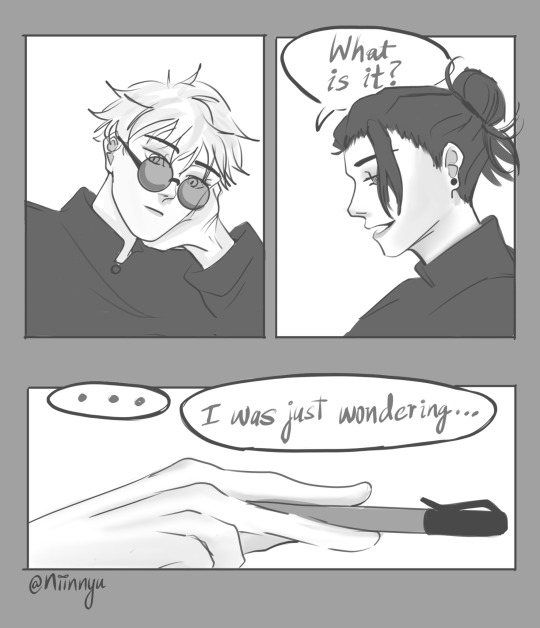
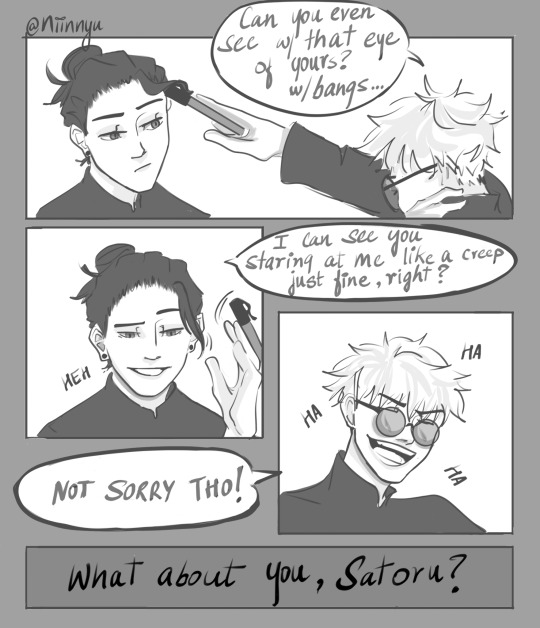


(May 2022) Personally, I really like the theory of gojou losing 6 eyes (in a narrative sense).

Possible foreshadowing hasn't been incredibly subtle either. These are from the 2 openings and the Phantom Parade video (Avant by Eve, which is technically not canon but still a recurring theme). Vivid Vice especially had a bunch of foreshadowing for the Shibuya arc, so I wouldn't be surprised if this was slipped in there too.
#satosugu#stsg#jjk#jujutsu kaisen#geto suguru#gojo satoru#kenjaku#jjk fanart#jujutsu kaisen fanart#niinnyu arts#six eyes#i dont imagine it happening like this#but thought this was fun#jjk theory#can't believe i drew this on my phone#old art#phone art#comic#something something#cw blood#cw gore#not much to but still just to be safe
229 notes
·
View notes
Text
y'know what only now really clicked?
gojo is basically presented as a modern buddha, we know that. and geto started wearing heian style buddhist monk robes. which leaves us with 3 major conclusions:
1) geto is stuck in a dark yet glorified past, while gojo is living in an enlightened but horrific present
2) geto sought to become like gojo - to be "enlightened" (powerful) like him, to be his true equal. despite everything reaching toward the light in the darkness
3) the visual metaphor the clothes tell us is that geto was praying to gojo - praying for gojo to reach back out to him and pull him from the darkness. extend that spider's silk to the sinner in hell. a silent cry for help from a mind that has internalized and internalized and internalized so much guilt, so much hatred, that he couldn't ever vocalize his own pain, his own need for help, his own love.
and the worst is that satoru did - did reach out, did open up, did lay his true feelings out bare... but at that point it was too late to change.
suguru was already dying.
satoru's love blessed suguru - the one to inherit the curse. and his love cursed satoru himself - the one to inherit the blessing. maybe in that moment, one on the verge of death and the other more emotionally vulnerable than he would ever be again, they were human like never before. not just cursed. not just blessed. but both. torn up both physically and emotionally and yet open and truly smiling like they couldn't be before.
simply teenagers.
simply young adults.
simply human.
#i hate them so much <3#watch me write genuine analysis and then suddenly careen into my emo bs halfway through#jujutsu kaisen#satosugu#stsg#jjk analysis#gojo satoru#geto suguru#jo's theory corner
125 notes
·
View notes
Text

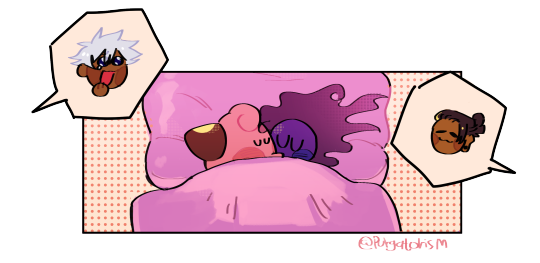
[first id: a fanart of gojo satoru and geto suguru as high school students. gojo bends down with his eyes sparkling as he watches his cleffa waddles curiously towards geto and his gastly. geto laughs good-naturedly as his gastly nervously hides behind him, patting its round head.
second id: gojo's cleffa and geto's gastly are tucked in under a tiny blanket, on a pillow bigger than the both of them. cleffa's tiny hand is clinging onto gastly. gojo watches them with sparkling eyes and a big grin while geto smiles fondly. /end id]
he's just shy!!!!!
#remembered the 'gengar is clefables shadow' theory again n thought whoa wait those mons fit stsg#jujutsu kaisen#gojo satoru#geto suguru#satosugu#stsg#jjk#gojo#geto#artsy pastry#described
450 notes
·
View notes